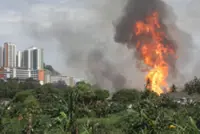SANAA, Sept. 14 (Xinhua) -- The Yemeni people, already burdened by yearslong turmoil, now face another challenge posed by the unrelenting severe drought, a disaster brought on by climate change.
This crisis poses a significant threat to Yemen's agricultural sector, which is a lifeline for millions in this war-torn nation.
"This drought is a slow, silent disaster that cuts us deep," said Majed Yahya Mouaidh, a farmer from the Hamdan district of Sanaa Province.
In the villages on the outskirts of Sanaa, arid and cracked soil and dry wells are a common sight. In Sawan village, about 10 kilometers northeast of the country's capital, the water reservoir has nearly dried up. This year's meager rainfall has driven its water levels dangerously low, casting a menacing shadow over the local villagers heavily reliant on their land.
"The harvest will not be good. I don't know what to do. I can't afford to drill wells, and by the time of the harvest, my crops will have withered away," lamented Mouaidh, burdened with the responsibility of supporting his eight-member family through his land.
In a recent report, the United Nations (UN) said that climate change-related natural hazards have exacerbated the humanitarian crisis in the war-ravaged country, adding that extreme weather events have destroyed irrigation facilities and led to the loss of agricultural livelihoods in Yemen, thereby increasing food and livelihood insecurity.
The report pointed out that extreme weather, featuring severe drought and torrential rains and floods, is testing the already-faltered infrastructure in the country.
In 2022, Yemen experienced two successive extreme weather events. First, a severe drought caused widespread crop failure and displacement. Then, heavy rains and floods destroyed infrastructure and displaced even more people.
This summer, the story repeats itself. Yemen's limited water infrastructure hinders its capacity to manage the erratic rainfall effectively. As a result, Yemen finds itself caught in a cycle rotating between heavy rain and extended drought amid scorching heat.
Muntaser Hizam, an agricultural research expert at the Yemeni Ministry of Agriculture and Irrigation, confirmed that many crops have suffered due to the impacts of both droughts and floods, as well as heat-related stress. This has led to a general decline in agricultural productivity.
"Yemen's climate crisis is a stark reminder that the environment, too, bears the brunt of conflict, with far-reaching consequences for its people," stated the expert.
The impact of the climate crisis is being felt most acutely by the poorest and most vulnerable people in Yemen. Many farmers are struggling to make ends meet, and food prices are rising.
According to the UN, Yemen saw the number of displaced caused by natural hazards and disasters double in 2022.
"Throughout years of war, we have suffered. However, with the steady harvest of the land, our family has tried to get by. But the drought this year becomes a last straw for us," said Mouaidh, gazing anxiously at the withering crops in his land.









































